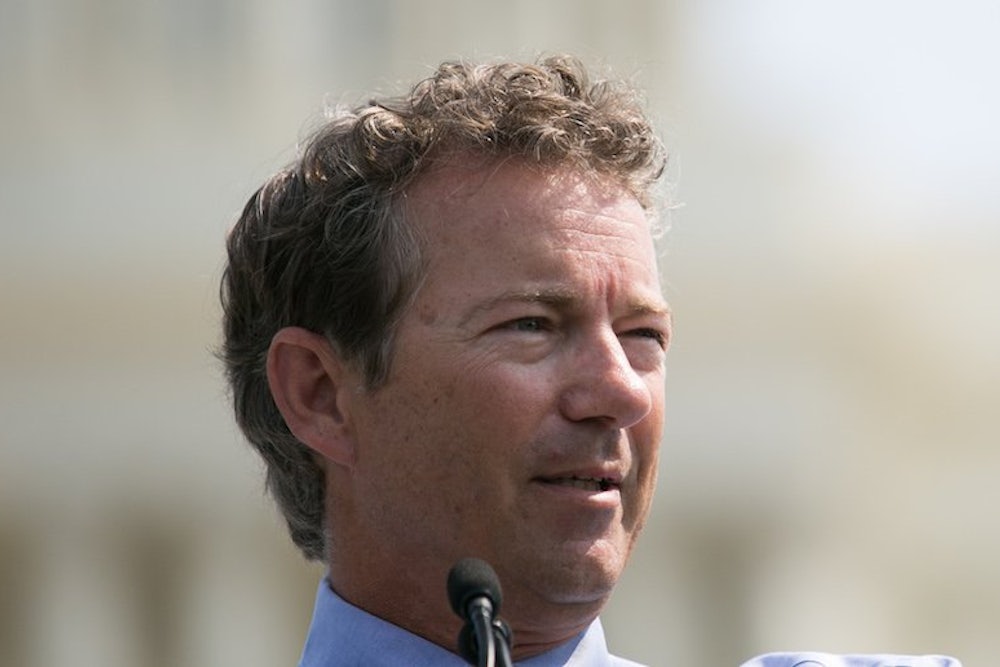From the time he arrived in the Senate in 2011, Rand Paul has not-so-quietly staked out a number of important positions that could be categorized as not only libertarian but also liberal. He has brought public scrutiny to the Obama administration's drone policy; he has criticized the NSA's excesses; he has blasted sentencing disparities between whites and minorities; and he has drawn attention to the scourge of drug sentencing more broadly. Paul's history raises legitimate questions about the sincerity of these positions, and the kookiness of his broader anti-government ideology means that the prospect of him as the President of the United States is a truly frightening one. But as a Senator in an extremely doctrinaire and conservative party, Paul has his virtues, and his uses.
The august institution where Paul currently resides already has enough partisan hacks and soulless moderates. It is currently a slow and broken chamber containing little creative policymaking and extreme discipline within the two caucuses. To say someone was a valuable senator once meant that he or she sponsored important legislation, but in today's Senate important legislative proposals exist to die. The best thing that Senators can do is raise their voices and spotlight issues that are being undercovered. One way to do this, largely because the media adores politicians who break ranks, is speaking out in "surprising" ways. By questioning the consensus on things such as executive power and drug laws, Paul is thus valuable and even unique.
Even if one takes this view of the Kentuckian, however, there are two crucial reasons to be skeptical of him. The first is that he supports a hardcore libertarian agenda that is disconnected from reality, and would be catastrophic if ever implemented. The second reason concerns his sincerity. Paul has seen the Republican Party lose several presidential elections in the past 25 years, and he wants to re-brand the G.O.P. He has compared the Party to the bad crust of a Domino's Pizza, implying that both had to change. But even that odd metaphor suggests that Paul wants the G.O.P. to rethink its public posture as much as its actual positions. To mix a metaphor, the crust of a pizza is not its heart.
As an example of the line Paul has been trying to walk, there was the news this weekend, featured on the front page of The New York Times, that the Senator was diverging from the Republican Party over its disgusting voter ID laws. This might at first glance have seemed like a very bold move. But in fact Paul laid out something less than a substantive position. “Everybody’s gone completely crazy on this voter ID thing,” Paul said. “I think it’s wrong for Republicans to go too crazy on this issue because it’s offending people.” This is something less than saying that the laws are discriminatory or racist or should be immediately repealed. (Julia Ioffe captured some of Paul's calculations on racial issues in a cover story last year for The New Republic.)
Dave Weigel, at Slate, has updated a piece of his on the subject with a quote from a former Paul chief-of-staff (and the current director of Paul's PAC), explaining that Paul thinks these decisions should be left up to states, and that he was merely calling into question the GOP's extensive focus on the issue. (To Paul's credit, he did stake out a position in favor of letting ex-felons vote.) The voter ID issue thus captures the ideological muddle that results when Paul departs (even a little bit) from partisan orthodoxy. Regardless of his sincerity, his commitment to hardcore libertarianism and his anti-Washington sentiment ensure that he will never challenge, say, disastrous state laws. He either wants to shrink the federal government by cutting off its funding, or merely send its responsibilities to the states. He is incapable of actually laying out a coherent agenda on issues where the major problem is not government overreach.
And yet none of these concerns really matter all that much, on the condition that Paul stays in the Senate. Senators don't need a coherent agenda, or even creative policy solutions. But presidents do, and a White House driven by Paul's ideology would be dangerous. Moreover, there are many reasons to think Paul's actual values are scary. He is the man who once refused to wholeheartedly support the Civil Rights Act of 1964. He is the man who, as Jonathan Chait has pointed out, keeps finding himself in close association with neo-Confederate nutbags, one of whom was the author of his book. ("Who among us," Chait asked, "has not entrusted the explication of his worldview to a man who has cheered on the assassination of President Lincoln?") But it doesn't matter so much what's in a Senator's heart, and this Senator's willingness to discuss controversial and important issues is valuable. Paul should forget 2016, and stay right where he is.
